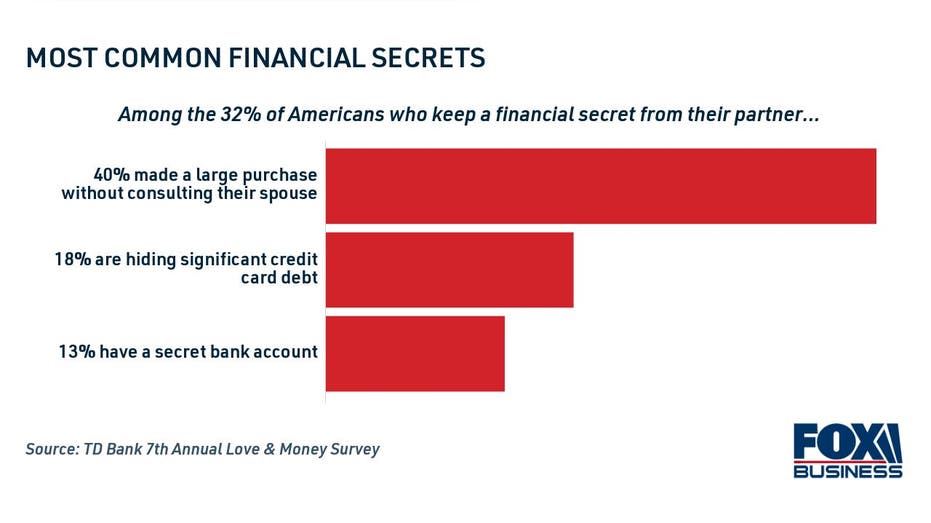32% of Americans are keeping a financial secret from their partner, survey claims
Hidden purchases and secret debts can put tremendous strain on a relationship

A new survey from TD Bank claims that nearly a third of couples experience financial infidelity, like hiding a large purchase or holding secret debts. (iStock)
Just in time for Valentine's Day, TD Bank revealed how couples in serious relationships are spending — and hiding — their money in its seventh annual Love and Money survey.
Nearly a third of Americans (32%) are keeping a financial secret from their romantic partner, an 11% increase from last year. The most common financial secrets are a big purchase (40%), significant credit card debt (18%) and a hidden bank account (13%).

Of note, half (50%) of partners in an unhappy relationship experience financial infidelity, compared to a third (32%) of those in a happy relationship, the survey claimed. TD Bank spokesperson Alissa Van Volkom said that "when debt, financial secrets or unemployment enter a relationship, both partners need to stand firm on what matters to them."
"The pandemic has shown you can't put a price on many things – financial health, stability and happiness included," Van Volkom added.
Keep reading to learn more about managing money with your significant other, including how to be more transparent with your financial behavior. You can visit Credible to compare rates on a variety of financial products, so you and your partner can meet your financial goals together.
PAYING OFF $10K IN CREDIT CARD DEBT WITH A PERSONAL LOAN COULD SAVE YOU THOUSANDS
How couples can become more transparent in money management
Keeping secrets in a relationship can sow guilt and embarrassment — and financial infidelity is no exception. Being more honest with your spouse about your shared finances can help build a more trusting relationship with clear financial goals.
"Couples should discuss three things on a regular basis: how they're managing their budget, unforeseen or upcoming expenses, and increasing debt," said Van Volkom.
Read more in the sections below for tips on how to have open conversations with your partner about financial transparency.
Discuss your budget
While creating a shared budget may not seem like the most romantic date idea, it can help you and your partner see how you're managing your income and expenses. Tracking your spending can help you identify areas where you may be overspending and find opportunities to increase your savings.
A simple way to streamline your budget is to download a financial app that automates the process. Budgeting apps can link with your bank accounts to give you a clear picture of your financial situation. More than half (57%) of Americans have financial apps on their smartphone, according to TD Bank's survey.
HOW TO CLEAR YOUR CREDIT CARD STATEMENTS FAST
Plan for unexpected expenses
Among Americans who are keeping a financial secret from their partner, the most common is that they're hiding a big purchase (40%). For couples with shared finances, making a large purchase without your partner's knowledge can make budgeting and tracking expenses more difficult.
One way to plan for unforeseen costs is to create an emergency fund that covers about three to six months' worth of expenses. You can kickstart your emergency fund by setting up a Direct Deposit from your paycheck into a high-yield savings account. You can compare savings account rates on Credible for free without impacting your credit score.
ARE BABY BOOMERS TO BLAME FOR THE HOUSING SHORTAGE?
Make a plan for paying down debt
Nearly a fifth (18%) of survey respondents with a financial indiscretion are hiding secret credit card debt. This is problematic because revolving credit card debt that's carried over from month comes with high interest rates, making it difficult to repay.
When discussing a debt management plan with your partner, consider the following strategies for paying down credit card balances:
- Debt snowball or debt avalanche method. The debt snowball method is when you pay off the credit cards with the smallest balances first, while the debt avalanche strategy is when you repay the debt with the highest interest rates first.
- Credit card balance transfers. Applicants with very good to excellent credit may qualify for a 0% APR introductory period, affectively allowing you to repay credit card debt at zero interest. You can compare balance transfer card offers across multiple credit card companies at once on Credible.
- Debt consolidation loans. This is a type of unsecured personal loan that's used to repay high-interest debt in fixed monthly installments at a lower rate. Two-year personal loan interest rates are currently at historic lows, according to the Federal Reserve.
You can visit Credible to learn more about debt management and compare personal loan interest rates. That way, you and your partner can make an informed decision on how to pay off credit card debt.
MILLENNIALS, GEN ZERS PLAN TO LOWER STUDENT LOAN PAYMENTS WITH REFINANCING
Have a finance-related question, but don't know who to ask? Email The Credible Money Expert at moneyexpert@credible.com and your question might be answered by Credible in our Money Expert column.




















